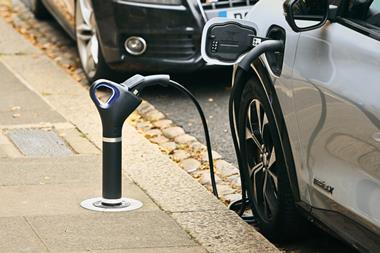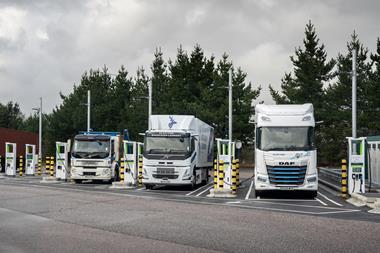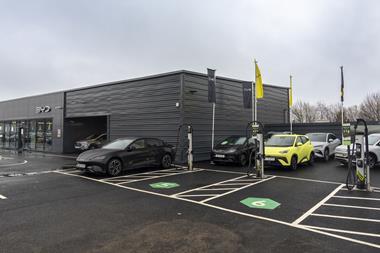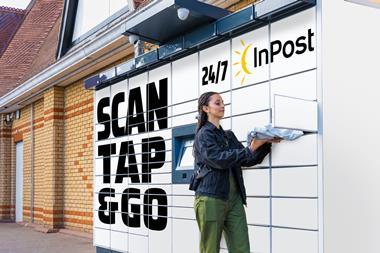- Net Zero Strategy sets out how the UK will deliver on its commitment to reach net zero emissions by 2050
- Outlines measures to transition to a green and sustainable future, helping businesses and consumers to move to clean power, supporting hundreds of thousands of well-paid jobs and leveraging up to £90 billion of private investment by 2030
- Reducing Britain’s reliance on imported fossil fuels will protect consumers from global price spikes by boosting clean energy

The government is investing up to £1billion to support the electrification of UK vehicles and infrastructure, including a zero-emission vehicle mandate, as part of its Net Zero Strategy unveiled today.
Building on the Prime Minister’s 10 Point Plan, the UK Net Zero Strategy sets out a comprehensive economy-wide plan for how British businesses and consumers will be supported in making the transition to clean energy and green technology – with the aim of lowering Britain’s reliance on fossil fuels by investing in sustainable clean energy in the UK, reducing the risk of high and volatile prices in the future, and strengthening energy security.
The announcement revealed an extra £350 million to support the electrification of UK vehicles and their supply chains; and another £620 million for targeted electric vehicle grants and infrastructure - particularly local on-street residential charge points - with plans to put thousands more zero-emission cars and vans onto UK roads through a zero-emission vehicle mandate. From 2035, all new cars and vans must be zero emission at the tailpipe.
The plans also included £140 million Industrial and Hydrogen Revenue Support scheme to accelerate industrial carbon capture and hydrogen, bridging the gap between industrial energy costs from gas and hydrogen and helping green hydrogen projects get off the ground.
Prime Minister Boris Johnson said: “The UK’s path to ending our contribution to climate change will be paved with well-paid jobs, billions in investment and thriving green industries – powering our green industrial revolution across the country.
“By moving first and taking bold action, we will build a defining competitive edge in electric vehicles, offshore wind, carbon capture technology and more, whilst supporting people and businesses along the way.”
Mike Hawes, SMMT chief executive, said: “The automotive industry is putting zero-emission vehicles on Britain’s roads at pace beyond all forecasts, such is the choice and appeal of these new models.
“A well-designed, flexible regulatory framework could help maintain or even increase this pace to ensure we deliver on our shared decarbonisation ambitions.
“Consumers need choice and encouragement, irrespective of where they live or what they drive. The additional targeted funding for electric vehicles is welcome and will help ensure affordability for certain models. To ensure we have the reliable, accessible and nationwide charge-point network this transition needs, however, requires a similar regulatory approach. The announcement of additional funds for on-street residential charging must energise much-needed private sector investment but consumers will only have confidence in the future if there are commensurate and binding requirements on the infrastructure sector. Combining regulatory commitments with financial ones is the key to a successful transition to zero-emission road transport.”
Gill Nowell, head of Electric Vehicles at LV= General Insurance, said: “Today’s announcement is a move in the right direction but ultimately the devil will be in the detail. There needs to be an instrumental shift to increase the supply and availability of battery electric vehicles, so they are appealing for people across the UK, whatever their circumstances or income bracket.
“Getting more electric cars on the roads now will also boost the second-hand market for years to come, which is essential in making the market more affordable for more people.
“In parallel, support for charging infrastructure is vital, but this must be underpinned by a strategic approach to help local authorities and communities deploy the right type of chargers where they are most needed.”
Tanya Sinclair, director of Policy UK, Ireland and Nordics, ChargePoint, said: ”ChargePoint welcomes the government’s bold step towards transport decarbonisation by announcing the introduction of a ZEV mandate today, the first commitment of its type in Europe. We have seen the positive impacts on EV uptake of these schemes in North America, where they have significantly built up availability and consumer confidence of electric vehicles.
”Across our fast-growing charging sector, a UK ZEV mandate will create huge confidence for those operating and investing in the charging industry. This industry - consisting mainly of startups and scale ups - will for the first time be able to clearly anticipate demand for charging infrastructure and create a clear roadmap to meet these targets.
”With this new policy, the UK is taking an essential step on the road to 2030 as well as contributing to the creation of a better EV driver experience in the UK.”
Sue Robinson, Chief Executive of the National Franchised Dealers Association (NFDA), said: “A combination of financial support measures such as the plug-in electric vehicle grant and a reliable, easy-to-access charging infrastructure is vital to ensure that the majority of motorists embrace the transition to zero emissions. Although it is unclear how the funds announced today will be allocated, these investments represent a positive step.
“It is imperative that the Government continues to support vehicle retailers and consumers to accomplish the ambitious goal of ending the sale of internal combustion vehicles by 2030/2035 and reaching net zero emissions by 2050.
“To help achieve these targets, NFDA has been working closely with its franchised dealer members to facilitate the transition to zero emissions through our Government backed Electric Vehicle Approved (EVA) accreditation scheme which recognises retailers’ expertise in the sector and supports consumer confidence.
“We will continue to liaise with relevant stakeholders and industry partners, and we look forward to seeing further details about the Government’s plans”.
Paul Willcox, managing director, Vauxhall, said: ”Vauxhall welcomes the UK government’s announcement to implement a zero-emission vehicle mandate which will provide clarity to the UK motor industry and the rest of the electric vehicle ecosystem, on the basis of a 360-degree approach. [
”Vauxhall believes a ZEV mandate can work in the UK provided there are complimentary targets on the other key parts of the electric vehicle ecosystem which are key to driving Britain to a more sustainable transport infrastructure. With our Ellesmere Port plant set to become the first electric vehicle-only factory within the Stellantis group, we look forward to working with the government on the detail of how a ZEV mandate can be implemented and help support a sustainable vehicle marketplace in the UK.”
Transport - key commitments
• End the sale of new petrol and diesel cars and vans from 2030; from 2035, all new cars and vans must be zero emission at the tailpipe.
• Introduce a zero emission vehicle mandate setting targets for a percentage of manufacturers’ new car and van sales to be zero emission each year from 2024.
• Take forward our pledge to end the sale of all new, non-zero emission road vehicles by 2040, from motorcycles to buses and HGVs, subject to consultation.
• Ensure the UK’s charging infrastructure network is reliable, accessible, and meets the demands of all motorists. Later this year, we will publish an EV infrastructure strategy, setting out our vision for infrastructure rollout, and roles for the public and private sectors in achieving it.
• Building on the £1.9 billion from Spending Review 2020, the Government has committed an additional £620 million to support the transition to electric vehicles. The funding will support the rollout of charging infrastructure, with a particular focus on local on-street residential charging, and targeted plug-in vehicle grants. • Build a globally competitive zero emission vehicle supply chain and ensure our automotive sector is at the forefront of the transition to net zero.
• Lead by example with 25% of the government car fleet ultra low emission by December 2022 and all the government car and van fleet zero emission by 2027.
• Take action to increase average road vehicle occupancy by 2030 and reduce the barriers to data sharing across the transport sector.
• Maximise carbon savings from the use of low-carbon fuels, including by increasing the main Renewable Transport Fuel Obligation (RTFO) target.
• Increase the share of journeys taken by public transport, cycling and walking.
• Support decarbonisation by investing more than £12 billion in local transport systems over the current Parliament.
• Invest £2 billion in cycling and walking, building first hundreds, then thousands of miles of segregated cycle lane and more low-traffic neighbourhoods with the aim that half of all journeys in towns and cities will be cycled or walked by 2030. As announced in the Transport Decarbonisation Plan, we will create at least one zero- emission transport city.
• Invest £3 billion in the National Bus Strategy, creating integrated networks, more frequent services, and bus lanes to speed journeys, and support delivery of 4,000 new zero emission buses and the infrastructure needed to support them.
• Electrify more railway lines as part of plans to deliver a net zero rail network by 2050, with the ambition to remove all diesel-only trains by 2040.
Read the Net Zero Strategy document here.
































No comments yet